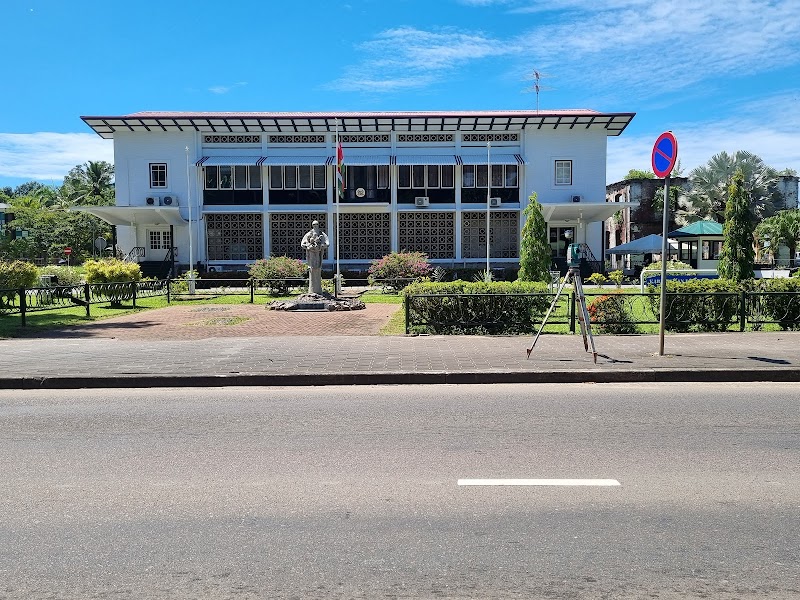Johan Ferrier (May 12, 1910 – January 4, 2010) was the first democratically elected President of Suriname and served from 1975 to 1980.
Background and History:
- Johan Henri Eliza Ferrier was born in Paramaribo, Suriname, on May 12, 1910.
- His father, Henricus Ferrier, was a lawyer and politician who served as a member of the colonial parliament of Suriname.
- His mother, Adriana Louisa Ferrier-de Rooy, was a schoolteacher.
- Ferrier attended the “Hendrik School” primary school and the “Hendrik School” high school in Paramaribo.
- He then studied law at the University of Leiden in the Netherlands, graduating in 1933.
Ethnicity:
- Ferrier was of mixed Afro-Surinamese, Jewish, and Dutch ancestry.
- His ethnic background reflects the diverse cultural heritage of Suriname, which is home to people of various ethnicities, including African, Dutch, Amerindian, Javanese, Chinese, and Indian.
Achievements, Legacy, and Popular Beliefs:
- First democratically elected President of Suriname:
Ferrier was elected President in 1975, becoming the first democratically elected President of Suriname following its independence from the Netherlands in 1975. His presidency marked a significant milestone in Suriname’s history and the beginning of a new era of democracy and self-governance.
- Advocate for democracy and human rights:
Ferrier was a strong advocate for democracy, human rights, and the rule of law throughout his career. As President, he implemented various reforms aimed at strengthening democratic institutions and protecting the rights of all Surinamese citizens.
- Establishment of the University of Suriname:
During his presidency, Ferrier oversaw the establishment of the University of Suriname, which became the first university in the country. The university’s founding marked a significant step towards improving access to higher education for Surinamese students and expanding educational opportunities.
- Promotion of national unity and reconciliation:
Ferrier actively promoted national unity and reconciliation among different ethnic groups in Suriname. He encouraged dialogue, understanding, and cooperation between various communities, contributing to a more cohesive and harmonious society.
- Respected figure and elder statesman:
After his presidency, Ferrier continued to be a respected figure and elder statesman in Suriname. He was known for his wisdom, integrity, and commitment to the well-being of his country.
- Popular beliefs and folklore:
Ferrier’s presidency coincided with a period of social change and transformation in Suriname. His name and image became associated with certain popular beliefs and folklore among some segments of the population. Some people attributed supernatural powers or special abilities to him, demonstrating the aura and mystique that surrounded his presidency.
Johan Ferrier’s presidency marked a turning point in Suriname’s history, as the country transitioned from colonial rule to independence and democratic governance. His dedication to democracy, human rights, and national unity left a lasting legacy that continues to inspire future generations.

Emblem of Suriname
To enrich your insights into presidential figures worldwide, also explore some prominent first presidents from other countries, such as Sudan, Sri Lanka and Spain. Delving into the leadership journeys of these figures can offer valuable perspectives on their historical significance and pivotal roles in shaping global politics.
The official residence and symbol of the Suriname President
10 Iconic Presidents Who Shaped Suriname’s History

Suriname, a small country located on the northeastern coast of South America, has had several popular presidents throughout its history. These leaders have left a lasting impact on the country’s politics and development. Here are 10 of the most popular presidents in Surinamese history:
- 1. Johan Ferrier (1975-1980): Suriname’s first president after gaining independence from the Netherlands, Ferrier was highly respected for his integrity and diplomatic skills.
- 2. Henck Arron (1975-1980): Arron served as the country’s first prime minister and later became the second president. He played a crucial role in Suriname’s early years of independence and is remembered as a charismatic leader.
- 3. Jules Wijdenbosch (1996-2000): As Suriname’s sixth president, Wijdenbosch implemented economic reforms and infrastructure projects, including the construction of the Johan Adolf Pengel International Airport.
- 4. Ronald Venetiaan (1991-1996, 2000-2010): Serving three non-consecutive terms as president, Venetiaan is widely regarded as a competent and humble leader who focused on stability and democracy.
- 5. Desi Bouterse (1980-1988, 2010-2020): Despite controversial policies and accusations, Bouterse maintained a significant support base and was elected president twice. He focused on infrastructure development and social programs.
- 6. Chan Santokhi (2020-present): The current president of Suriname, Santokhi is widely respected for his dedication to fighting corruption, improving public safety, and strengthening foreign relations.
- 7. Johan Adolf Pengel (1963-1969): Pengel served as Suriname’s third president and is known for his role in the country’s transition to a full-fledged parliamentary democracy.
- 8. Runaldo Ronald Venetiaan (1991-1996, 2000-2010): A two-time president, Venetiaan promoted peaceful democratic transition and economic stability during his terms.
- 9. Ramsewak Shankar (1999-2000): Shankar briefly held the position of acting president and is remembered for overseeing the democratic transition after Jules Wijdenbosch’s presidency.
- 10. Lachmipersad Arya Bhagwandas (2005): Bhagwandas served as the acting president for a short period and made history as Suriname’s first person of Indo-Surinamese descent to hold the highest office in the country.

